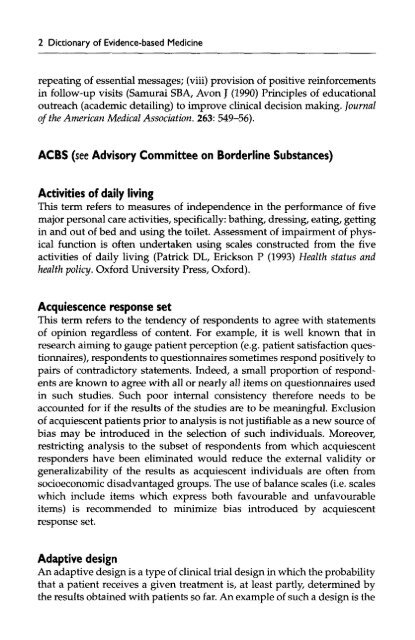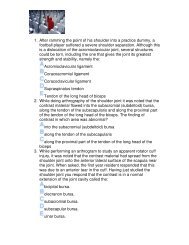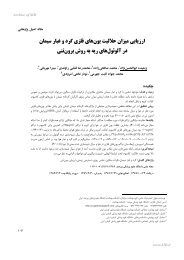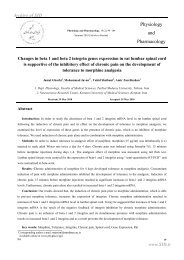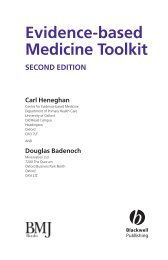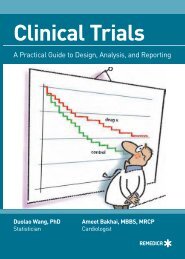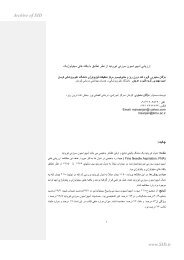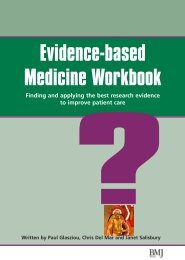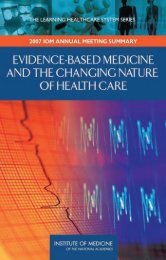Dictionary of Evidence-based Medicine.pdf
Dictionary of Evidence-based Medicine.pdf
Dictionary of Evidence-based Medicine.pdf
Create successful ePaper yourself
Turn your PDF publications into a flip-book with our unique Google optimized e-Paper software.
2 <strong>Dictionary</strong> <strong>of</strong> <strong>Evidence</strong>-<strong>based</strong> <strong>Medicine</strong><br />
repeating <strong>of</strong> essential messages; (viii) provision <strong>of</strong> positive reinforcements<br />
in follow-up visits (Samurai SB A, Avon J (1990) Principles <strong>of</strong> educational<br />
outreach (academic detailing) to improve clinical decision making. Journal<br />
<strong>of</strong> the American Medical Association. 263: 549-56).<br />
ACBS (see Advisory Committee on Borderline Substances)<br />
Activities <strong>of</strong> daily living<br />
This term refers to measures <strong>of</strong> independence in the performance <strong>of</strong> five<br />
major personal care activities, specifically: bathing, dressing, eating, getting<br />
in and out <strong>of</strong> bed and using the toilet. Assessment <strong>of</strong> impairment <strong>of</strong> physical<br />
function is <strong>of</strong>ten undertaken using scales constructed from the five<br />
activities <strong>of</strong> daily living (Patrick DL, Erickson P (1993) Health status and<br />
health policy. Oxford University Press, Oxford).<br />
Acquiescence response set<br />
This term refers to the tendency <strong>of</strong> respondents to agree with statements<br />
<strong>of</strong> opinion regardless <strong>of</strong> content. For example, it is well known that in<br />
research aiming to gauge patient perception (e.g. patient satisfaction questionnaires),<br />
respondents to questionnaires sometimes respond positively to<br />
pairs <strong>of</strong> contradictory statements. Indeed, a small proportion <strong>of</strong> respondents<br />
are known to agree with all or nearly all items on questionnaires used<br />
in such studies. Such poor internal consistency therefore needs to be<br />
accounted for if the results <strong>of</strong> the studies are to be meaningful. Exclusion<br />
<strong>of</strong> acquiescent patients prior to analysis is not justifiable as a new source <strong>of</strong><br />
bias may be introduced in the selection <strong>of</strong> such individuals. Moreover,<br />
restricting analysis to the subset <strong>of</strong> respondents from which acquiescent<br />
responders have been eliminated would reduce the external validity or<br />
generalizability <strong>of</strong> the results as acquiescent individuals are <strong>of</strong>ten from<br />
socioeconomic disadvantaged groups. The use <strong>of</strong> balance scales (i.e. scales<br />
which include items which express both favourable and unfavourable<br />
items) is recommended to minimize bias introduced by acquiescent<br />
response set.<br />
Adaptive design<br />
An adaptive design is a type <strong>of</strong> clinical trial design in which the probability<br />
that a patient receives a given treatment is, at least partly, determined by<br />
the results obtained with patients so far. An example <strong>of</strong> such a design is the


